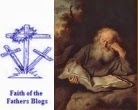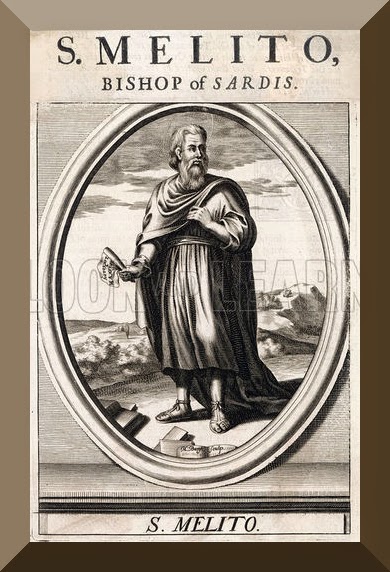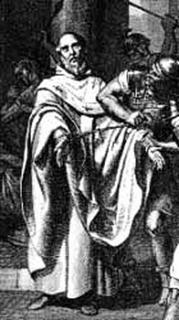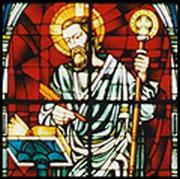"Come, then, all you nations of men, receive forgiveness for the sins that defile you. I am your forgiveness. I am the Passover that brings salvation. I am the lamb who was immolated for you. I am your ransom, your life, your resurrection, your light, I am your salvation and your king. I will bring you to the heights of heaven. With my own right hand I will raise you up, and I will show you the eternal Father."
--From a letter by Saint Melito of Sardis
Saint Melito of Sardis was Bishop of the Church in Sardis, and a prominent ecclesiastical writer in the latter half of the second century. Indications are that he was the second Bishop of Sardis, and was successor to “the angel of the Church of Sardis” (the apostle of that Church) to whom was addressed one of the apocalyptic messages. Very little is known of his life, and the majority of his writings exist only in fragments, and quotations from Eusebius, Polycrates, Tertullian, and others. A letter of Polycrates of Ephesus to Pope Victor about 194 states that "Melito the eunuch (this is interpreted "the virgin" by Rufinus in his translation of Eusebius), whose whole walk was in the Holy Spirit", was interred at Sardis, and had been one of the great authorities in the Church of Asia who held the Quartodeciman theory (this was those Churches, primarily in Asia Minor, who celebrated Easter according to the Jewish calendar for Passover).
Saint Melito gave us the earliest indications of the Canon of the Old Testament in his writings, and Saint Jerome, speaking of this canon, quotes Tertullian that Melito was esteemed as a prophet by many of the faithful. Saint Melito, also wrote an apology to the emperor Marcus Aurelius, in which he defended the Christians against accusations made against them, urged the emperor to end the persecutions of the Christians, and even urged Aurelius to proclaim Christianity the religion of the Roman Empire!
Saint Melito was also one of the earliest writers to have written on the dual natures of Christ: "For there is no need, to persons of intelligence, to attempt to prove, from the deeds of Christ subsequent to His baptism, that His soul and His body, His human nature like ours, were real, and no phantom of the imagination. For the deeds done by Christ after His baptism, and especially His miracles, gave indication and assurance to the world of the Deity hidden in His flesh. For, being at once both God and perfect man likewise, He gave us sure indications of His two natures: of His Deity, by His miracles during the three years that elapsed after His baptism; of His humanity, during the thirty similar periods which preceded His baptism, in which, by reason of His low estate as regards the flesh, He concealed the signs of His Deity, although He was the true God existing before all ages."
In the early 20th century, there was great excitement among Christian scholars when a homily by Saint Melito on Easter, “Peri Pascha”, was discovered. This homily shows how the early Christians saw Christ's suffering, death, and resurrection foreshadowed throughout The Old Testament. Indeed, in the writings attributed to Saint Melito by Eusebius, the prolific writer Melito gave a listing of the books of The Old Testament, which Saint Melito referred to as “The Old Books”, which indicates to many scholars that the Church of Melito's time may well have had a New Testament as well. There is also a strong indication from the fragments of Melito's writing that exist in references by Tertullian, Eusebius, Polycrates, and others, that Saint Melito made extensive use of the Gospel of Saint John, and he may have been acquainted with Saint Polycarp, Saint Ignatius of Antioch, and other Early Church Fathers of his day. His writings influenced the thinking of Irenaeus of Lyons, Clement of Alexandria, and Tertullian.
One always gets a great insight to the beliefs and workings of the early Church by reading the writings of those great men, who lived and died for the truth, which is Christ Jesus, was Christ Jesus, and will be Christ Jesus, now and forever. You may read some of those writings (fragments and a homily) online by clicking the titles to go to the sites. You can read Melito the Philosopher, also Easter Praise of Christ by Melito of Sardis, Lamb That Was Slain by Melito, and On The Passover by Melito. Saint Melito is believed to have been martyred around the time he wrote his apology to Marcus Aurelius circa 180 A.D.
The following was written by Saint Jerome, in his book, Lives of Illustrious Men :
Melito the Bishop
Melito of Asia, bishop of Sardis, addressed a book to the emperor Marcus Antoninus Verus, a disciple of Fronto the orator, in behalf of the Christian doctrine. He wrote other things also, among which are the following: On the passover, two books, one book On the lives of the prophets, one book On the church, one book On the Lord's day, one book On faith, one book On the psalms, one On the senses, one On the soul and body, one On baptism, one On truth, one On the generation of Christ, On His prophecy, one On hospitality and another which is called the Key, one On the devil, one On the Apocalypse of John, one On the corporeality of God, and six books of Eclogues. Of his fine oratorical genius, Tertullian, in the seven books which he wrote against the church on behalf of Montanus, satirically says that he was considered a prophet by many of us.
A prayer written by Saint Melito of Sardis
Prayer in Praise of Christ
Born as a son,
led forth as a lamb,
sacrificed as a sheep,
buried as a man,
he rose from the dead as a God,
for he was by nature God and man.
He is all things:
he judges, and so he is Law;
he teaches, and so he is Wisdom;
he saves, and so he is Grace;
he begets, and so he is Father;
he is begotten, and so he is Son;
he suffers, and so he is Sacrifice;
he is buried, and so he is man;
he rises again, and so he is God.
This is Jesus Christ,
to whom belongs glory for all ages.
Quotes from the writings of Saint Melito of Sardis:
"God has suffered from the right hand of Israel. Head of the Lord--His simple Divinity; because He is the Beginning and Creator of all things". --From “The Oration on Our Lord's Passion”.
"God who is from God; the Son who is from the Father; Jesus Christ the King for evermore...He that bore up the earth was borne up on a tree. The Lord was subjected to ignominy with naked body--God put to death, the King of Israel slain!" --From “The Discourse On The Cross”.
"We have collected together extracts from the Law and the Prophets relating to those things which have Been declared concerning our Lord Jesus Christ, that we may prove to your love that this Being is perfect reason, the Word of God; He who was begotten before the light; He who is Creator together with the Father; He who is the Fashioner of man; He who is all in all; He who among the patriarchs is Patriarch; He who in the law is the Law; among the priests, Chief Priest; among kings, the Ruler; among prophets, the Prophet; among the angels, Archangel; in the voice of the preacher, the Word; among spirits, the Spirit; in the Father, the Son; in God, God; King for ever and ever." --From “The Discourse On Faith”
“The Lord, though he was God, became man. He suffered for the sake of whose who suffer, he was bound for those in bonds, condemned for the guilty, buried for those who lie in the grave; but he rose from the dead, and cried aloud: "Who will contend with me? Let him confront me." I have freed the condemned, brought the dead back to life, raised men from their graves. Who has anything to say against me? I, he said, am the Christ; I have destroyed death, triumphed over the enemy, trampled hell underfoot, bound the strong one, and taken men up to the heights of heaven: I am the Christ.” --From a letter by Saint Melito.
Copyright © 2005 Steve Smith. All Rights Reserved








